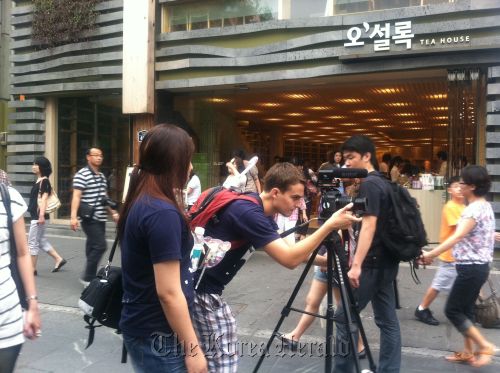For the past six years, Korean and American university students have gathered at Ewha Womens University to participate in the Harvard Summer School in Seoul program.
This summer, the program offered for the first time “Cinema Seoul: Documenting Korea Through Film,” a course that presented students with the opportunity to view Korean history and culture from a different perspective ― behind camera lenses.
Split into groups of four and armed with filming equipment, students embarked on the task of filming various aspects of Korean culture in Seoul. Afterward, they diligently compiled their clips into 15-20 minute documentaries and on July 29 presented their final products at the 2011 Ewha-Harvard Student Documentary Film Festival.
“It is remarkable how finished and organically whole these films are,” said Haden Guest, a professor of Harvard University who co-taught the class with Prof. David Chung of the University of Michigan.
“A majority of the students have never taken a film class, but despite the challenges they faced as novice filmmakers, they created sophisticated, smart films about Korea.”
 |
Harvard University student Nic Galat adjusts his camera while filming in the streets of Seoul. (Harvard Korea Institute) |
To most of the students, the opportunity to explore Korea given by the film class was equally as important as learning cinematography and film techniques.
“Viewing Seoul from behind the camera has broadened my appreciation for both film and Korea,” said Mimi Yuanshen Xu, a Harvard undergraduate student in the summer school program.
“I originally became interested in Korea because of K-pop and K-dramas, but they give limited insight into Korean culture. After interviewing native Koreans for my documentary, I feel like I’ve established a stronger connection to and a greater understanding of Korean culture.”
“As a native Korean I thought I knew a lot about my country, but this documentary class made me realize that I was taking my culture for granted,” said Kim Ji-yu, a student at Ewha Womens University.
“Many people don’t pay attention to the environment in which they were raised, but when you are forced to film, scrutinize and analyze your own culture, you discover a lot of things you may have never noticed. Also, participating in a program with foreigners gave me the chance to see my culture in another point of view.”
At the conclusion of the film festival, Chung announced that each of the films used distinct personalities and voices when addressing pressing issues in South Korea.
But despite being different in content, every film shared at least one similar characteristic, Haden Guest said. “Each film had optimistic visions, and I find that to be encouraging. They are something we can all learn from.”
Documentaries screened:
“Arson of History” by Elizabeth Susie Double, Sven Hentschel, Hyun Yoojin, and Kristen Zelenka investigates South Korea’s reaction to the burning of Sungnyemun and the ever-changing market of Namdaemun.
“Debut” by Kim Bo-min, Fatoumata Fall, Nicholas Galat, and Park Hye-min follows the life of indie musicians Yimoha (Free Spirit), a band that blends traditional African music with western influences.
“Handmade Victory” by Daily Guerrero Brito, Jasmine Cho, Park Jeong Yun, and Park Rakyung examines the struggles independent restaurants and bakeries in Seoul face as they swim upstream against the growing number of franchises in South Korea.
“K-Pop Dreams” by Hong Je-yeon, Kim Bom-yi, Margaret Min, and Jeffrey Mo digs into the not-so-glamorous life of idol trainees and the hardships they experience prior to debuting.
“Offsides” by Chung Yonbom, Mateus Falci, Kim Tae-yeon, and Suh YiSeul documents the problems parents and children of multicultural families in South Korea face and calls for the equal treatment of all Korean citizens.
“Trance” by Kim Ji-yu, Lee Cho-rong, Werner du Plessis, and Mimi Yuanshen Xu uncovers transgender nightlife in Itaewon and documents how drag shows can be used as a stand against stereotypical societal ideas in South Korea.
By Xing Lin, Intern Reporter (xinglin.xl@gmail.com)








